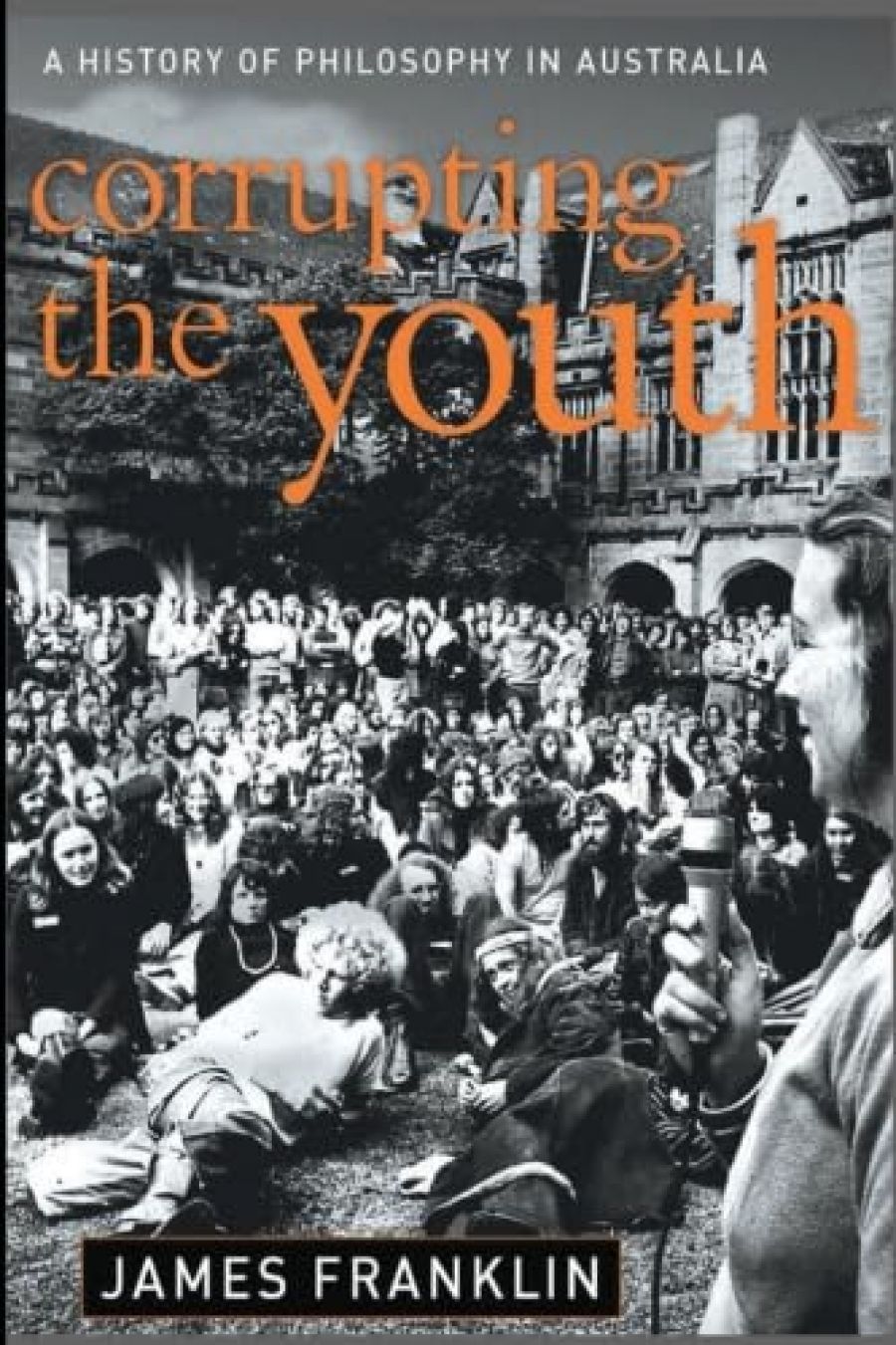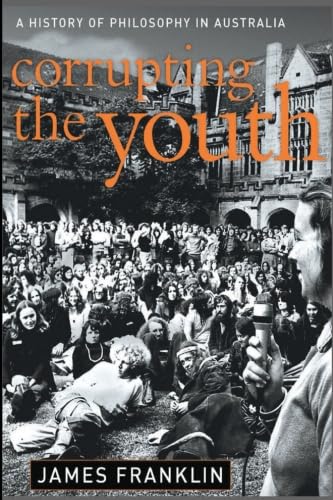
- Free Article: No
- Contents Category: Philosophy
- Custom Article Title: Copious corruption
- Review Article: Yes
- Article Title: Copious corruption
- Online Only: No
- Custom Highlight Text:
Socrates was executed in 399 BC, charged with refusing to recognise the state gods, introducing new divinities and corrupting the youth. The indictment was probably politically motivated. The philosopher was closely associated with the recently deposed oligarchy led by the murderous Critias, and he had taught Alcibiades, who betrayed the state. Later, Aeschines rebuked the Athenians: ‘You put Socrates the Sophist to death because he was shown to have educated Critias.’
- Book 1 Title: Corrupting The Youth
- Book 1 Subtitle: A history of philosophy in Australia
- Book 1 Biblio: Macleay Press, $59.95 hb, 465 pp
- Book 1 Cover Small (400 x 600):

- Book 1 Cover (800 x 1200):

- Book 2 Title: The Philosophy Of Sir William Mitchell (1861–1962)
- Book 2 Subtitle: A mind’s own place
- Book 2 Biblio: Edwin Mellen Press, US$129.95 hb, 454 pp
Sex had nothing to do with Socrates’ conviction, though that is not James Franklin’s view. In his new book, Corrupting the Youth: A History of Philosophy, he says that the charge that provides the main title of the book is ‘absolutely true’. Socrates, he thinks, sexually corrupted the youth. The putative evidence is an amazing misreading of Plato’s Symposium. According to Franklin, Socrates argued that it would be ‘a lot better … if the wise handed on knowledge for sexual favours’ instead of money. This is a bad gaffe – the lesson of Symposium is the opposite of Franklin’s contention – but it sheds considerable light on what follows.
Corrupting the Youth is a long, ambitious and in some ways original work. It is, to my knowledge, the first serious attempt to paint philosophy – very broadly construed – into the cultural landscape of Australia. It recounts the history of academic philosophy, from the arrival in 1927 of the formidable Scottish philosopher John Anderson, to some of the salient developments in the last decade. But the narration also includes much that is interesting on ‘the implicit philosophy’ embodied in secular education and culture, as well as some of the activities of the prominent figures who created, taught and criticised philosophy in this country. Since Franklin has a taste for the sensational, these activities, with few exceptions, fall into the fold of folly, fracas and peccancy.
In the academic line, the book begins with a discussion of Anderson’s moral and social philosophy and, more briefly and derivatively, the metaphysics that underpins it. There follow chapters on the philosophy of mind and science, in which Australian materialism and scientific realism are featured; on environmental philosophy and Franco-feminism; on Catholic philosophy, moral philosophy and practical ethics. Interspersed are brief discussions of logic, semantics, psychoanalysis and a few other things. In some of these areas, Australians have made distinctive and sometimes influential contributions, and they are aptly highlighted. This tour is good only in chunks. Many howlers and frivolities vitiate it and make you wonder if the guide knows where he is: licentious Socrates is just one example. Franklin’s sweep is wide but not deep. He describes the views of his subjects but rarely provides the arguments that sustain them.
Franklin tries, impossibly, to relate the story of Australian philosophy largely from an internal perspective. For example, Anderson, who had a significant impact in Australia, was influenced by the first revolutionary wave of Analytic philosophy, by G.E. Moore’s and Bertrand Russell’s repudiation of idealism, their robust realism and pluralism. He was quite untouched by the second wave (and some of his ablest students were alike in this), the linguistic turn articulated by Wittgenstein: philosophical problems arise because we misunderstand the logic of our language. That turn rapidly divaricated and transformed the way philosophers approached every branch of the discipline, and their understanding of the discipline itself. Franklin doesn’t discern how deeply those developments affected the practice of philosophy in Australia, even in Sydney. Australian philosophy has sometimes been original, but mostly it has companioned external trends, and the presentation here often appears shallow because there is no backdrop against which it can acquire depth. It is astonishing to find in such a long, heavily referenced text no mention in the index of Quine or Hare.
In Franklin’s story idealism is the bogey, and he harasses it in most of its incarnations. It is defined as ‘the doctrine that all is ideas: there is no truly physical world out there at all’. That’s a slack characterisation in any case, but if he is to bring his favourite targets into view he requires something broader, a Protagorean anti-realism in which our apprehension of the world is conditioned by products of mind, such as language and culture. Postmodernists, in his scheme, are linguistic idealists, and feminists, insofar as some of them question ‘objective truth’ or demonise logic, tend to idealism. Franklin doesn’t exactly say what is wrong with idealism, but David Stove is cited several times, assuring the reader that the arguments for it are very bad indeed. Franklin is acidulous on some of the postmodernist and feminist authors he cites. In my opinion, he is justified. Yet it is a limitation in his critical palette that he doesn’t pass much beyond derision; the historian, after all, has other obligations.
Franklin’s own philosophical proclivity is to metaphysical and moral realism. He opposes realism in metaphysics and science to idealism and instrumentalism; and in morality, to subjectivism and relativism. This is rough stuff: the characterisations of the various doctrines under these labels lack the subtlety essential to their identification. For example, Jean Curthoys and Raimond Gaita are enlisted to secure a ‘robustly objectivist account of morality’. Yet if push came to desperate shove, Gaita’s work would have to be aligned with the postmodernists. For although Gaita argues for the irreducibility and objectivity of moral facts, they are so only as internal to a particular tradition or conceptual scheme. The men who convicted Socrates did not share all of that scheme.
More successful are the lively interpolations of scandal. Lessons are extracted from Anderson’s affair with a young student, his political associations and ‘leftist ratbaggery’: ‘What … was the connection between Andersonian moral theory and his own activities? … [W]as this the man to be trusted with our sons and daughters?’ David Stove’s absurd confession that ‘his circle of Andersonian students shoplifted under Anderson’s influence’ caps the point. The story of University of Tasmania Professor Sydney Sparkes Orr’s seduction of a student, though well mined elsewhere, is given another run. There is an amusing, if injudicious, chapter on the philosophical inspiration of the Sydney Push, a set of ideas summed up as ‘simplistic and self-serving tripe’. Franklin has been diligent in the study of ASIO files, and that organisation’s reports on some of the actors in the Push provide much of the fun. The Knopfelmacher affair, the machinations that split the Sydney University philosophy department, and related matters are entertainingly retailed. Franklin digresses to the misdeeds of other ‘intellectual folk’. The Bogle–Chandler case is briefly aired and the psychiatrist Harry Bailey, a kind of Sweeney Todd of psychiatry who represents ‘the downside of the materialist attitude to mind’, gets a thorough work over.
The discussion of philosophical notions animating such mainstays as the scout movement, lifesaving, Freemasonry, the ideology of empire and heroic sacrifice, as well as the educational aims motivating the teaching of sport, and classical and English literature, has much merit. Franklin unifies these disparate sets of ideas under a particular problematic – now uncomfortably associated with the prime minister’s recent flirtation with morality. These various pedagogical activities are all considered to be practical devices for the teaching of values. Franklin seems genuinely troubled by ‘youth’s indifference to virtue’ and its ‘readiness to be corrupted’; he believes that young people require inspiration to virtue, and that virtue has to be taught. These conceptions should be questioned: in the main, the conditions they identify are created only when something in a child’s development has already gone profoundly wrong; and they are frequently nurtured in the pathologies of religion and intellectualism.
Two themes – the power of philosophy to corrupt and a kind of corollary, the need for philosophy to inspire virtue and provide life with meaning – are not discussed directly in the book, but flicker periodically. Franklin notes in the preface that fundamentals are dangerous: they reach into the depths of thought and conduct. ‘That is why,’ he says, ‘philosophy matters.’ Franklin is interested in philosophy, and no doubt in virtue, but he is more interested in polemicising against the power of philosophy, and of philosophers, to corrupt. I think he exaggerates their power, both to corrupt and to provide meaning. There are deep issues here, but they are not pursued. I notice only the intellectualist illusion that seems to underlie these thoughts: that corruption and virtue are principally matters of holding doctrines or beliefs.
This illusion is of a piece with the notion that life acquires meaning by internalising a system of philosophical or religious doctrines. Franklin is disappointed that ‘philosophy has not put forward a range of positive answers as to what the meaning of life might be’. He wonders ‘whether the health of the young is being affected … by a lack of philosophical meaning in life’. Maybe. But I would start the search elsewhere: in the famine of love, for example, the isolation and abandonment that now afflicts the young, the cruelty about us, the all-pervading mendacity that destroys trust in the world (now publicly memorialised in the casual institutionalisation of deceit as an instrument of government). So many sources of corruption. Why pick on the philosophers?
There is no shortage of argument in W. Martin Davies’s The Philosophy of Sir William Mitchell. Mitchell was a remarkable figure whose life spanned 101 years (he died in 1962) and progressed from professor of philosophy at the University of Adelaide to vice-chancellor and chancellor. He is little known as a philosopher: his writing was not always lucid, and he was overshadowed by Anderson and the developments in Linguistic philosophy mentioned above. That obscurity Davies has set himself to remedy, in a long, detailed and carefully argued study. It is a book for specialists. Sensitive to idealist concerns, deeply interested in science, Mitchell is as remarkable for the range of influences he absorbed as for an originality that in many ways is discernible only now against the backdrop of contemporary developments. Davies exposes not only Mitchell’s views but also those of important contemporaries he has anticipated, particularly in cognitive science, developmental psychology and philosophy of mind. Mitchell has been neglected as an idealist from whom our scientifically minded contemporaries have nothing to learn. Davies succeeds admirably in showing that to be an error, and in doing so recasts the historical landscape of Australian philosophy.


Comments powered by CComment